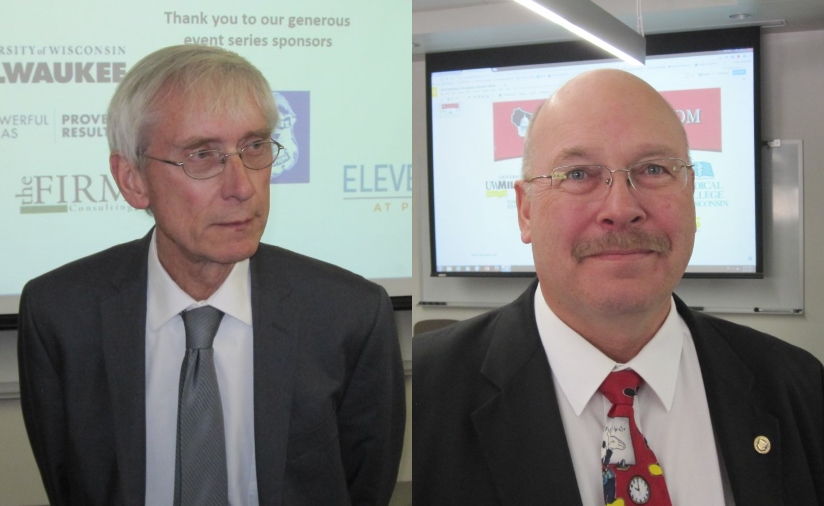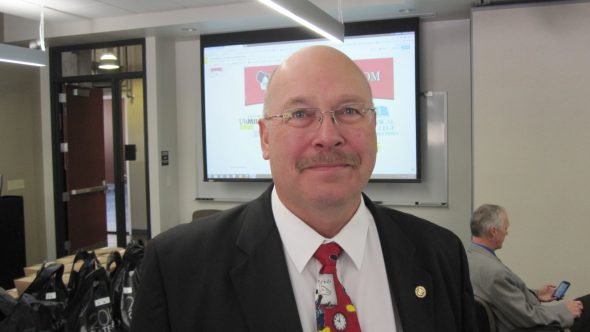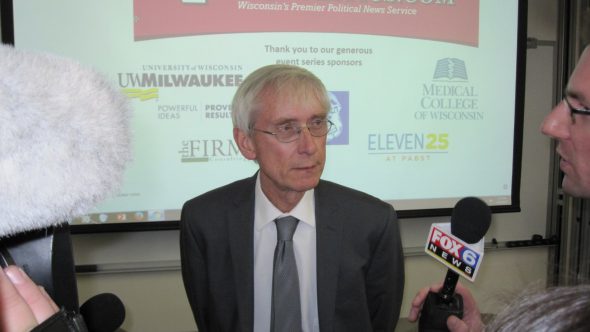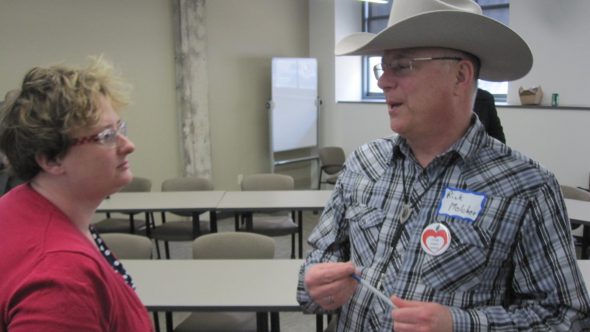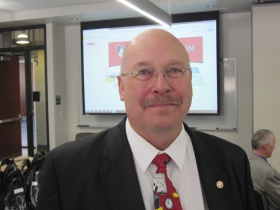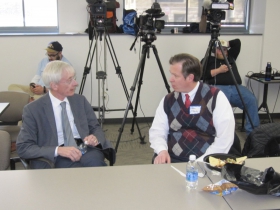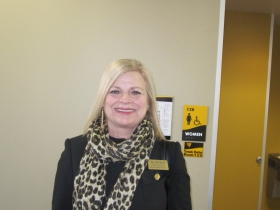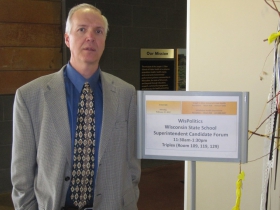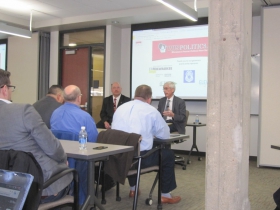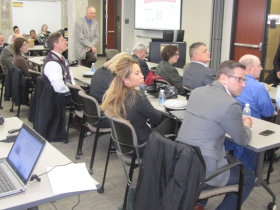Two Tall Men Duel Over Schools
Evers and Holtz square off in superintendent's race; sparks fly both ways.
Only one of the candidates for State Superintendent of Public Instruction has met Betsy DeVos. Guess which one? (You might be surprised.)
An event that was billed as an informational “candidate forum” for the non-partisan position took on a political edge Monday when the biggest story to come out of the event was whether challenger Lowell Holtz should be investigated for sending a political e-mail from a district account during school time, as was uncovered by One Wisconsin Now, a liberal advocacy group and reported by the media.
Holtz has also been accused of hatching a plan to offer a state-funded job to his formal rival John Humphries (and vice-versa) should one drop out, and the other win the April 4th general election. (Neither dropped out).
These hot topics and charges are more reminiscent of a partisan campaign than a competition between two men with Ph.D. degrees in education.
But much has changed in the educational environment since the enactment of Act 10 and growth of voucher and charter schools under Gov. Scott Walker.
Was First a Partisan Position
Beginning with statehood in 1848, Wisconsin’s superintendent was chosen in the November general election for a two year term on a partisan ticket, just like the other constitutional offices such as Governor, Attorney General or Secretary of State.
This state of affairs, with its predictable political convulsions, lasted until 1902, when voters approved an amendment to the state constitution that the office be non-partisan, with a four year term — twice as long as the governor’s term at the time, further insulating the position from politics.
But, like recent Supreme Court races which have been marked by sharp ideological divisions, the race for superintendent has becoming increasingly partisan. Evers has the support of traditionally Democratic groups such as unions and public school supporters, while Holtz, who calls himself the “Kidservative,” has the support of school choice groups traditionally allied with Republicans.
Evers took 69 per cent of the vote in a low-turnout three-way primary with Holtz earning 23 percent and John Humphries 7 percent.
Evers and Holtz met in Milwaukee on Monday for what was billed as a candidate forum — not a debate — sponsored by WisPolitics.com as part of its Milwaukee luncheon series, which comes to town about six times a year to discuss issues and events of the day.
The forum doesn’t have a regular home, says WisPolitics founder Jeff Mayers, but is thinking of settling down to a single venue. Right now the show was on the road at the UWM Joseph Zilber School of Public Health on the site of the former Pabst Brewery. As attendees and participants began filing in for the noon luncheon, Mayers greeted them at the door, and saw that everybody put on a name tag, however exempting the guests of honor from this requirement.
Meet the Candidates
Holtz was the first to arrive. He is a bit over 6 feet tall, bald and of fairly large build, dressed in a conservative suit and a not-so-conservative Mickey Mouse tie. You could easily imagine that this one-time teacher had taken five years off from his profession when his kids were young to serve as a police officer in Whitewater, which he did before returning to academia and its principaldoms and superintendencies. He recently retired from the Whitnall School District, from which his controversial e-mail was written.
Holtz said that when he was first named a school principal, he made it a goal to never be in the office, but rather in the classroom, where “it’s more fun.” And, for a guy who looks more like a coach than a superintendent, it would be easy to see him in the stands, cheering on his teams.
Evers followed Holtz by about 15 minutes. He, too, is tall, but in an angular way. He was dressed in a grey sports coat and grey tie over black trousers. His head is covered in white hair, with some of it swept forward.
Both men speak in simple modulated tones that teachers develop as part of their professional experience. During the hour-long discussion, neither raised his voice or brought up any personal observations about his opponent. Nor were the e-mails or job offers discussed until the end of the program.
That’s when the television reporters encircled Holtz, asking his side of the story — he said he would abide by whatever official finding results — and getting Evers’s response, which was that an investigation of his opponent’s e-mails would be a welcome thing.
On the Issues
The discussion was moderated by Mayers, who is accustomed to this sort of thing, and clearly familiar with the complexities of the state’s governance, including the $12 billion public instruction budget. He spoke without notes, and allowed the candidates to alternate in being the first to respond to a query.
Evers, the incumbent, got the first shot. He was asked what his plans were for the next four years.
They were “relatively straightforward,” he said.
- Make sure we have the resources. Evers said he proposed a budget with $700 million in addional funding and the governor has adopted a good part of the budget, which will “absolutely” be adopted by legislature, he predicted.
- 1 in 5 students in state suffer from some mental health issues, and the budget will increase to assist these children.
- The shortage of teachers in rural areas must be solved.
- Change the rhetoric around the teaching profession
- Change the dialog with the teaching profession.
- Work with Milwaukee Public Schools. Evers said he is “very supportive of Dr. Driver and the board.”
Holtz, the challenger, painted a different picture for his term:
- Wisconsin “can’t be last in graduation and achievement gaps” — with schools that are either incredibly successful or incredibly poor.
- “There are two ways of getting out of poverty: one is education — the other is crime.” Uneducated kids turn to crime.
- “Need to return safety to our schools.” Holtz on several occasions mentioned schools themselves as being unsafe, and referred to unsafe neighborhoods as a blighting influence on childhood education.
- Poverty is up in urban and rural areas
- Schools should give students an opportunity to compete for jobs.
Holtz also mentioned:
- Support for Walker’s increased funding for rural school transport.
- Support for the lifetime license proposal. “Some of the best teachers I ever had had lifetime licenses.”
- The state Department of Pubic instruction must face financial realities as it would a household budget: “Are we going to do the roof this year or does the furnace need help?”
Evers tried to downplay the political ramifications of the race:
- “There are people who say this is a Democratic or a Republican race.” Evers could work with a governor of either party, and noted that Walker called him before announcing his budget to say that Evers would be pleased with it, and he appears to be so.
The issue of Act 10 came up, and the two showed divergent views, as expected:
Holtz On Act 10:
- “Post-Act 10 I haven’t had to lay a single person off.” Previously, this was often required.
- “Money’s important but it’s not the deciding factor.”
- Welcomes Trump’s statement that feds would not intereferre with the state. “Welcome it with open arms.”
- Loves the concept of community schools.
- Involve business, Police Department, Fire Department in school activities and plans. “Businesses came up with better ideas than sometimes I could even dream of.”
- “Some of the most successful voucher schools are involved in the community.”
- “Kids grow up in what is almost a war zone.”
Evers on Act 10: Evers on Act 10:
- “Did Act 10 save money? Yes. It saved money by taking it out of other people’s pockets.”
- Act 10 turned out a generation that does not want to be teachers. “Who wants to be in a profession where you walk around with a target on your back?”
- Percentage of take home pay is down some 2 per cent.
- Kids in urban areas struggle with things that are beyond their control
- Job training for parents in schools should be considered.
- “‘No child left behind.’ Didn’t work.”
On Betsy DeVos
Holtz says he does not know Betsy DeVos, the new U.S. Secretary of Education and has not met her, but notes, “She has always been dedicated to the kids.” Evers says he has met and has talked with DeVos. “She is going to be using the bully pulpit. That is the primary job. The idea that she would do anything different than what Congress wants is irrational.”
Among the Attendees
The attendees included Dr. Deb Kerr, the Brown Deer School System Administrator, Meg Jones of the Journal Sentinel and her former colleague, Alan Borsuk (a senior fellow at the Marquette University School of Law) who continues to write on educational issues.
Rick Melcher, a school teacher from Racine was in the audience of 50 wearing a cowboy hat, announcing that he is a write-in candidate for the position. Fox 6 political reporter Theo Keith was there, killing time with a cowboy-related pastime of his own: reading the recently released autobiography of Sheriff David Clarke. Keith found the book somewhat thin in its coverage of Clarke’s life from 1956, when he was born, to 2002, when he became sheriff.
Kashoua Yang, the candidate for judge, made an appearance at the forum, while her challenger Scott Wales did not. These two have been everywhere the last couple of months, vying to replace retiring judge John Siefert.
Cudahy alderman Justin Moralez, a former moderate Republican candidate for assembly attended the event, as did Van Mobley, a Concordia University professor who announced his support for Donald Trump in March, 2016. He had a pleasant, sit-down chat with Evers prior to the event.
Photos from the Event
If you think stories like this are important, become a member of Urban Milwaukee and help support real, independent journalism. Plus you get some cool added benefits.
Plenty of Horne
-
Milwaukee Modernism Gains National Awards
 Dec 15th, 2025 by Michael Horne
Dec 15th, 2025 by Michael Horne
-
New Rainbow Crosswalks Mark Milwaukee’s LGBTQ+ History
 Oct 8th, 2025 by Michael Horne
Oct 8th, 2025 by Michael Horne
-
Welcome Back, Tripoli Country Club!
 May 27th, 2025 by Michael Horne
May 27th, 2025 by Michael Horne


